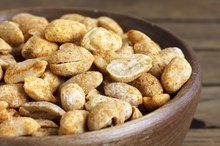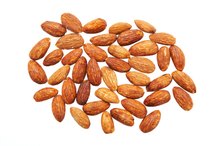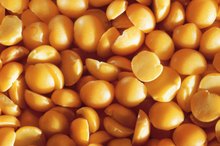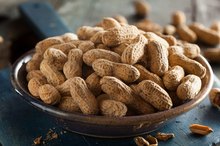Healthy Benefits of Boiled Peanuts
Peanuts are a healthy snack, and the boiled varieties are far leaner than their roasted counterparts. All peanuts provide healthy fats as well as fiber, both of which satiate you to prevent hunger pangs that could lead to overeating. However, salted peanuts are high in sodium -- a single ounce provides more than 200 milligrams of the mineral, almost 10 percent of the recommended daily maximum intake. Too much salt can lead to high blood pressure and bloating, so look for unsalted peanuts or try boiling your own without adding salt.
Fat and Calories
Shelled, boiled peanuts have about 90 calories and 6 grams of fat per 1-ounce serving -- that's significantly less than dry-roasted peanuts, which contain 170 calories and 14 grams of fat per ounce. However, it's still important to watch portion sizes; mindlessly munching half a cup of boiled peanuts, which is easy to do, sets you back nearly 300 calories and 20 fat grams. Most of the fat in peanuts is monounsaturated and polyunsaturated, which are healthier than saturated and trans fats because they help prevent high cholesterol and diabetes.
Heart Health
What Is the Nutritional Value of Peanuts?
Learn More
Peanuts may help prevent coronary heart disease, according to an analysis published in the "Journal of Nutrition" in 2008. Researchers examined four epidemiologic studies and found that subjects who ate the most peanuts or tree nuts had a 35 percent lower chance of suffering from coronary heart disease. Nut eaters tended to have less inflammation, lower LDL, or "bad" cholesterol, reduced oxidation and healthier blood vessels, all of which may have played a part in the reduced incidence of heart disease.
Fiber
Each serving of boiled peanuts has 2.5 grams of fiber, roughly 10 percent of the minimum amount you need in a day. Fiber is important for healthy digestion, helping to slow digestion for lasting fullness while preventing blood sugar spikes. Fiber also bulks up stool and helps prevent constipation. In addition, a high-fiber diet may be the key to preventing diverticulosis, or the presence of pouches in the intestines that trap food and can become inflamed and painful.
Allergies
Are Raw Peanuts Good for You?
Learn More
You're less likely to have an allergic reaction to boiled peanuts than roasted peanuts, according to research published in the "Journal of Allergy and Clinical Immunology" in 2001. Researchers noticed that Chinese people were less likely to be allergic to peanuts than Americans, and speculated that the reason may lie in cooking methods. Sure enough, peanuts that were boiled or fried were less likely to cause an allergic reaction than the roasted variety. Researchers theorized that higher temperatures used in roasting increased the allergenic traits of peanut proteins.
Related Articles
References
- U.S. Department of Agriculture and National Agriculture Library: Nutrient Data for 16088, Peanuts, All Types, Cooked, Boiled, with Salt
- U.S. Department of Agriculture and National Agricultural LIbrary: Nutrient Data for 16090, Peanuts, All Types, Dry-Roasted, with Salt
- American Diabetes Association: Fats
- PubMed.gov: The Role of Tree Nuts and Peanuts in the Prevention of Coronary Heart Disease: Multiple Potential Mechanisms
- MayoClinic.com: Healthy diet: End the Guesswork with these Nutrition Guidelines
- MedlinePlus: Diverticulitis
- PubMed.gov: Effects of Cooking Methods on Peanut Allergenicity
Writer Bio
Nina K. is a Los Angeles-based journalist who has been published by USAToday.com, Fitday.com, Healthy Living Magazine, Organic Authority and numerous other print and web publications. She has a philosophy degree from the University of Colorado and a journalism certificate from UCLA.









